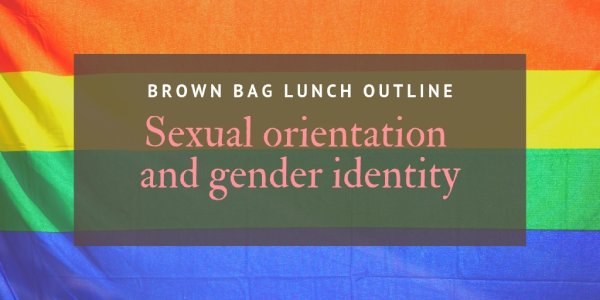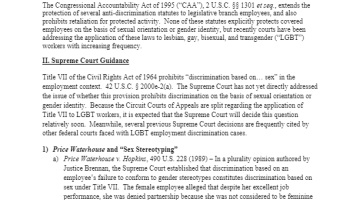I. Introduction
The Congressional Accountability Act of 1995 (“CAA”), 2 U.S.C. §§ 1301 et seq., extends the protection of several anti-discrimination statutes to legislative branch employees and also prohibits retaliation for protected activity. None of these statutes explicitly protects covered employees on the basis of sexual orientation or gender identity, but recently courts have been addressing the application of these laws to lesbian, gay, bisexual, and transgender (“LGBT”) workers with increasing frequency.
II. Supreme Court Guidance
Title VII of the Civil Rights Act of 1964 prohibits “discrimination based on… sex” in the employment context. 42 U.S.C. § 2000e-2(a). The Supreme Court has not yet directly addressed the issue of whether this provision prohibits discrimination on the basis of sexual orientation or gender identity. Because the Circuit Courts of Appeals are split regarding the application of Title VII to LGBT workers, it is expected that the Supreme Court will decide this question relatively soon. Meanwhile, several previous Supreme Court decisions are frequently cited by other federal courts faced with LGBT employment discrimination cases
1) Price Waterhouse and “Sex Stereotyping”
a) Price Waterhouse v. Hopkins, 490 U.S. 228 (1989) – In a plurality opinion authored by Justice Brennan, the Supreme Court established that discrimination based on an employee’s failure to conform to gender stereotypes constitutes discrimination based on sex under Title VII. The female employee alleged that despite her excellent job performance, she was denied partnership because she was not considered to be feminine enough. In a concurring opinion, Justice O’Connor described the factual circumstances giving rise to the claims: “the District Court found that the partner responsible for informing Hopkins of the factors which caused her candidacy to be placed on hold, indicated that her ‘professional’ problems would be solved if she would ‘walk more femininely, talk more femininely, wear make-up, have her hair styled, and wear jewelry.’ As the Court of Appeals characterized it, Ann Hopkins proved that Price Waterhouse ‘permitt[ed] stereotypical attitudes towards women to play a significant, though unquantifiable, role in its decision not to invite her to become a partner.’” Id. at 272 (internal citations omitted). According to the plurality, “we are beyond the day when an 2 www.compliance.gov employer could evaluate employees by assuming or insisting that they matched the stereotype associated with their group,” and such “sex stereotyping” is prohibited by Title VII. Id. at 251.

